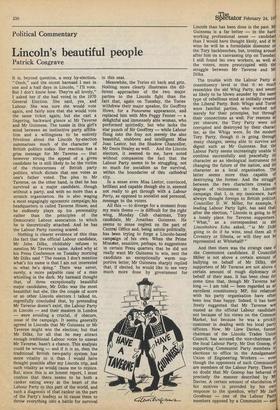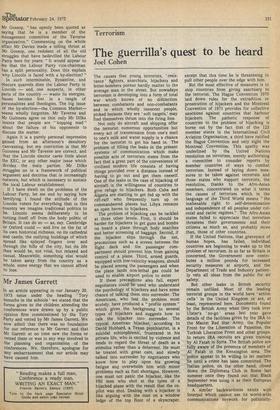Political Commentary
Lincoln's beautiful people
Patrick Cosgrave
It is, beyond question, a sexy by-election. " Oooh," said the nicest barmaid I met in one and a half days in Lincoln, "I'll vote. But I don't know how. They're all lovely," I asked her if she had voted in the 1970 General Election. She said, yes, and Labour. She was sure she would vote again, and fairly sure that she would vote the same ticket again; but she cast a lingering, backward glance at Mr Taverne and Mr Guinness. The tussle in this girl's mind between an instinctive party affiliation and a willingness to be entirely frivolous about •the Lincoln by-election summarises much of the character of British politics today. Her reaction has a grim message for Mr Taverne — that however strong the appeal of a given candidate he is still likely to be the victim of the rhinoceroses of British party politics, which dictate that one votes as one's father voted. The plus to Mr Taverne, on the other hand, 1s that he has survived as a major candidate, though without a party, and with no more than a scratch organisation. He is also waging a most engagingly egocentric campaign; his headquarters is called Taverne House, and he endlessly plays up his personality rather than the principles of the Democratic Labour association to which he is theoretically attached. And he has the Labour Party running scared.
Nothing is clearer evidence of this than the fact that the official Labour candidate, Mr John Dilks, childishly refuses to mention Mr Taverne's name. Asked why at his Press Conference on Tuesday morning Mr Dilks said "The reason I don't mention what's his name is that I am not interested in what he's doing." There was never, surely, a more palpable case of a man whistling in the dark. My barmaid thought that, of three exceptionally beautiful major candidates, Mr Dilks was the most beautiful: but she, like the couple of score or so other Lincoln electors I talked to, regretfully concluded that, by pretending Mr Taverne doesn't exist, the Labour Party in Lincoln — and their masters in London — were avoiding a crucial, if obscure, issue of the campaign. It seems generally agreed in Lincodn that Mr Guinness or Mr Taverne might win the election; but that Mr Dilks, for all that he may attract enough traditional Labour votes to unseat Mr Taverne, hasn't a chance. This analysis could be wrong — and if it is so, then the traditional British two-party system has more vitality in it than I would haVe thought possible after my Lincoln trip, and such vitality as would cause me to rejoice. But, since this is an honest report, I must confess that there seems to be both a canker eating away at the heart of the Labour Party in this part of the world, and such a diagnosis of that canker on the part of the Party's leaders as to cause them to throw everything into a battle for survival in this seat.
Meanwhile, the Tories sit back and grin. Nothing more clearly illustrates the dif ferent approaches of the two major parties to the Lincoln fight than the fact that, again on Tuesday, the Tories withdrew their major speaker, Sir Geoffrey Howe, for a Panorama appearance, and replaced him with Mrs Peggy Fenner — a delightful and immensely able woman, who performed spiritedly, but who lacks the star punch of Sir Geoffrey — while Labour flung into the fray not merely the also beautiful, stubborn and intelligent Miss Joan Lestor, but the Shadow Chancellor, Mr Denis Healey as well. And the Lincoln electors, it seemed to me, have noted without compassion the fact that the Labour Party seems to be struggling, not so much for socialism as for survival, within the boundaries of this cathedral city.
In a sense even Miss Lestor, convinced, brilliant and capable though she is, seemed not really to get through with a Labour Party, as opposed to socialist and personal, message to the voters.
All this — to diverge for a moment from my main theme — is difficult for the right wing, Monday Club chairman, Tory candidate, Mr Jonathan Guinness. He seems to sense neglect on the part of Central Office and, being astute politically, has been trying to forge a Lincoln-based campaign of his own. When the Prime Minister, sensitive, perhaps, to suggestions in certain Press quarters that he did not really want Mr Guinness to win, sent the candidate an exceptionally warm supportive letter, Mr Guinness sharply replied that, if elected, he would like to see very much more done by government for Lincoln than has been done in the past. Mij Guinness is a far better — in the hard working professional sense — candida than I would have thought likely, and if h wins he will be a formidable dissenter the Tory backbenches, but, trotting around after him on a canvassing trip on Tuesday, I still found his own workers, as well as the voters, more preoccupied with th struggle between Mr Taverne and Mr Dilks.
The trouble with the Labour Party at constituency level is that it so mu resembles the old Whig Party, and seems as likely to be blown asunder by the sam type of rebellious mind as initially creat the Liberal Party. Both Whigs and Tories were familial parties, who worked no merely for their principles, but througli their connections as well. For reasons a$ yet obscure, the Tory Party were noi corrupted and destroyed by their charac ter, as the Whigs were. So the moderti Tory Party, though it is going througll many changes, seems able to survive an digest such as Mr Guinness. But the Labour Party seems increasingly unable to combine successfully and peacefully its character as an ideological instrument for changing the future of the nation, and itS character as a local organisation. The latter seems more than capable of destroying the former. And the struggle between the two characters creates e degree of viciousness in the Lincoln campaign that I, in my innocence, have always thought foreign to British politicS Councillor D .W. Miller, for example, $ leading Labour Party light, has said that after the election, "Lincoln is going to be, a lonely place for Taverne supporters. "What," as a correspondent in the Lincolnshire Echo asked, "is Mr Dilld going to do if he wins, send them all to Coventry or Siberia, or will they not be represented at Whitehall?"
And then there was the strange case 01 the Communist candidates. If CouncillOs Miller is not above a certain amount of bullying on behalf of Mr Dilks, the supporters of Mr Taverne are not above 11 certain amount of rough diplomacy on behalf of their man.. It has been clear fOr some time that, though Mr Taverne has long — I am told — been regarded as an excellent constituency MP, his relations with his party organisation have often been less than happy. Indeed, it has been freely suggested that Mr Taverne vas ousted as the official Labour candidate, not because of his views on the Common Market, but because he was a prickly' customer in dealing with his local partY officers. Now, Mr Llew Davies, former chairman of the Lincoln Trades Union Council, has accused the vice-chairman of the local Labour Party, Mr Don Gossop, Of supporting Communist Party members in elections to office in the Amalgamated Union of Engineering Workers — even though the opponents of such Communists are members of the Labour Party. There is no doubt that Mr Gossop •has behaved in precisely the manner described by MI, Davies. A certain amount of elucidation or his motives is provided by his ovin response to the question, why? Mr Jacl‘ Goodman — one of the Labour PartY members opposed by a Communist — said
Mr Gossop, "has openly been quoted as saying that he is a member of the management committee of the Taverne organisation." Commenting on the whole affair Mr Davies made a telling thrust at Mr Gossop, one redolent of all the old struggles that have bedevilled the Labour Party here for years: " It would appear to me that the Labour Party vice-chairman has a split personality. Does this explain why Lincoln is faced with a by-election? "
In such interminable, Byzantine, and obscure quarrels does the Labour Party in Lincoln — and, one suspects, in other Parts of the country — waste its energies. Issues become lost in a tangle of Personalities and theologies. The big issue of the by-election---the Common Market— seems wholly forgotten. Mr Taverne and Mr Guinness agree on this: only Mr Dilks insists that people are " hopping mad " about the failure of his opponents to discuss the matter.
Again it is a purely personal impression gained from an afternoon's desultory canvassing, but my conviction is that Mr Guinness and Mr Taverne are correct, and that the Lincoln elector cares little about the EEC, or any other major issue which divides the main parties. Mr Dilks struggles on in a framework of political argument and doctrine that is increasingly outworn, but which is necessary to sustain the local Labour establishment.
If I have dwelt on the problems of the Labour Party, let me end by saying how terrifying I found the attitude of the Lincoln voters for everything that in this country we imagine traditional politics to be. Lincoln seems deliberately to be cutting itself off from the body politic of Britain. It can do so — as, say, Cambridge or Oxford could — and live on the fat of its own historical richness, on its cathedral and castle, the outlying buildings of which Spread like splayed fingers over and through the hills of the city, but its life then would be, not vital, but relaxed and casual. Meanwhile, something else would be taken away from the country as a Whole, some energy that we cannot afford to lose.



































 Previous page
Previous page